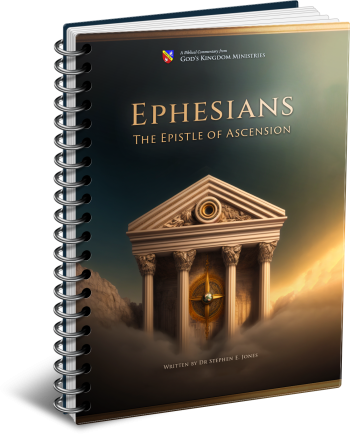Latest Posts
View the latest posts in an easy-to-read list format, with filtering options.

Paul's epistle to the Ephesians is, in some ways, a continuation of his epistle to the Romans. It enlarges upon Romans 1-8 in regard to the believer's position and right standing with God. We are "seated" with Christ, so we must "walk" according to our calling, and "stand" in the full armor of God against those who would oppose us.
Category - Bible Commentaries

Enlarging on the subject of God’s workmanship, Paul writes in Eph. 2:11, 12,
11 Therefore remember that formerly you, the Gentiles in the flesh, who are called “Uncircumcision” by the so-called “Circumcision,” which is performed in the flesh by human hands— 12 remember that you were at that time separate from Christ, excluded from the commonwealth of Israel, and strangers to the covenants of promise, having no hope and without God in the world.
The Ephesians themselves were Greeks, “Gentiles in the flesh” (by fleshly genealogy). The Jews referred to them as “Uncircumcision,” meaning that they were “strangers to the covenants of promise.” Circumcision was a sign of the covenant since the days of Abraham. Gen. 17: 11 says that “it shall be the sign of the covenant between Me and you.”
Nonetheless, Moses spoke of a different type of circumcision in Deut. 10:16-19,
16 So circumcise your heart and stiffen your neck no longer. 17 For the Lord your God is the God of gods and the Lord of lords, the great, the mighty, and the awesome God who does not show partiality nor take a bribe. 18 He executes justice for the orphan and the widow and shows His love for the alien by giving him food and clothing. 19 So show your love for the alien, for you were aliens in the land of Egypt.
Moses had the revelation of New Covenant circumcision, which is of the heart. He repeats this concept in Deut. 30:6,
6 Moreover, the Lord your God will circumcise your heart and the heart of your descendants, to love the Lord your God with all your heart and with all your soul, so that you may live [i.e., receive immortal life].
Only God can circumcise the heart. If He does not do it, no one else can. And when He does, we will love God with all our heart and soul. Fleshly circumcision lacks the power to change the heart in this manner. So we see that even as early as the time of Moses, heart circumcision was being revealed. When the Apostle Paul distinguished between fleshly and heart circumcision, he did so on the authority of Moses himself.
The underlying question that Paul addresses is that of identity. What constitutes a “Jew,” that is, a member of the tribe of Judah. For that matter, what constitutes membership in any of the Israelite tribes? In Rom. 2:28, 29, Paul wrote,
28 For he is NOT a Jew who is one outwardly, nor is circumcision that which is outward in the flesh. 29 But he IS a Jew who is one inwardly, and circumcision is that which is of the heart, by the Spirit, not by the letter; and his praise [“Judah” status] is not from men, but from God.
This is one of Paul’s teachings that scandalized the religious Jews of his day. The Jews believed that their fleshly circumcision was what constituted their membership in the tribe itself. Paul contradicted this, replacing the physical with spiritual heart circumcision. In other words, to be a member of the tribe of Judah, one had to have the sign of the New Covenant, not the Old. Further, one must recognize Jesus Christ, the Mediator of the New Covenant (1 Tim. 2:5; Heb. 8:6).
The bottom line is that any Jew who rejects Jesus Christ is not a Jew (or Judahite) in the eyes of God, though they may be recognized as Jews by men’s laws and opinions.
When Paul writes, “his praise is not from men, but from God,” he was using a play on words. Judah means “praise,” so Paul was really stating that his status as a Jew (Judahite) rests not on the opinions of men but solely by God’s recognition. This is the force behind Paul’s statement in Eph. 2:11, where he refers to Jews as “the so-called Circumcision, which is performed in the flesh by human hands.” It is “so-called,” because they relied upon fleshly circumcision to claim their status, and because Paul disputed their right to be called Jews.
We can understand, then, the heated dispute generated by Paul’s teaching. He insisted that even as Jews had trusted in Moses as the mediator of the Old Covenant, so also should they trust in Jesus Christ as the Mediator of the New Covenant. Paul uncompromisingly insisted that Jesus Christ came as the “prophet like Me from your brethren” (Acts 3:22), the Prophet whom Moses Himself foretold in Deut. 18:18.
In Eph. 2:6, Paul was expounding on the status of the believers and how they had been seated in heavenly places with Christ at the right hand of the Father. If these believers had visited the temple in Jerusalem, they would have been excluded from the inner court, along with all of the women. King Herod had built a “dividing wall” in the outer court (Eph. 2:14) as a barrier, so that only Jewish men had the right to approach the throne of grace.
Paul says that the Ephesian believers, who had received the Mediator of the New Covenant, and who had thus received heart circumcision, had the right to be seated with Christ at the right hand of the Father. They were not limited to the outer court with gentiles and Jewish women. They were not even limited to the Holy Place as were the priests. As part of the body of the great High Priest, they were able to enter the Most Holy Place in heaven and—even further—they were able to be seated with Christ on the throne of God, which was represented in the temple by the mercy seat.
Anyone touching the Ark of the Covenant would normally be killed. But yet those who are in Christ and identified as part of His body have no limitations in their status or position—except, of course, that Christ Himself is subject to the One who put all things under Him (1 Cor. 15:28).
At one time, those Ephesians had been “separate from Christ” and “excluded from the commonwealth of Israel” (Eph. 2:12). It was not their genealogy which separated them from Christ, nor was it their genealogy that had excluded them from the commonwealth of Israel. It was their lack of faith in Christ and their lack of heart circumcision that had separated them from God. It was never about genealogy.
By the same token, the unbelieving Jews in Paul’s day, having refused heart circumcision by rejecting the Mediator of the New Covenant, were equally separated from Christ and also from the commonwealth of Israel. The law is impartial in this regard, and this, I believe, is why Moses linked heart circumcision to “the awesome God who does not show partiality” toward “the alien” (Deut. 10:16-19).
The Ephesians were among those “aliens” in Paul’s day. Aliens are foreigners. In this case, they were not citizens of the commonwealth of Israel until they received membership through heart circumcision.
Paul continues in Eph. 2:13,
13 But now in Christ Jesus you who formerly were far off have been brought near by the blood of Christ.
Christ’s blood that was shed for the sin of the world (1 John 2:2), when applied properly, allows membership in the commonwealth of Israel. This is what drew to God those “who formerly were far off.”
Eph. 2:14, 15 then refers to the dividing wall that had kept Gentiles and women “far off” from God, saying,
14 For He Himself is our peace, who made both groups into one and broke down the barrier of the dividing wall, 15 by abolishing in His flesh the enmity which is the Law of commandments contained in ordinances, so that in Himself He might make the two into one new man, thus establishing peace.
Paul was making it clear to the Greek believers that they were in no way inferior to those who were physical descendants of Abraham. In teaching this, Paul also defined “peace” by contrasting it to “the enmity” that the dividing wall had caused. The Jewish view, reinforced daily by the dividing wall in the temple, asserted that God held Jewish men in higher esteem than Gentiles or women. This view invariably caused hard feelings, if not outright enmity.
Paul says that true peace is not possible until that dividing wall is abolished and both groups are fully united as “one new man.” Though Paul does not mention it, it is clear that women are included in the background. After all, the outer court was actually called “the court of women.” Paul’s teaching included women in another epistle, for we read in Gal. 3:28, 29,
28 There is neither Jew nor Greek, there is neither slave nor free man, there is neither male nor female; for you are all one in Christ Jesus. 29 And if you belong to Christ, then you are Abraham’s descendants, heirs according to promise.
The dividing wall was destroyed in 70 A.D., along with the temple itself, but its spiritual effects are still with us to this day. It is easy to destroy a wall; it is harder to eradicate men’s ungodly opinions that create ungodly divisions.
Breaking down this dividing wall has the power to establish the unity of husbands and wives in New Covenant marriages so that they can truly become “one flesh” (Gen. 2:24). In the big picture, the bride of Christ must also be married to Christ under the New Covenant in order to produce the heirs of the promise.